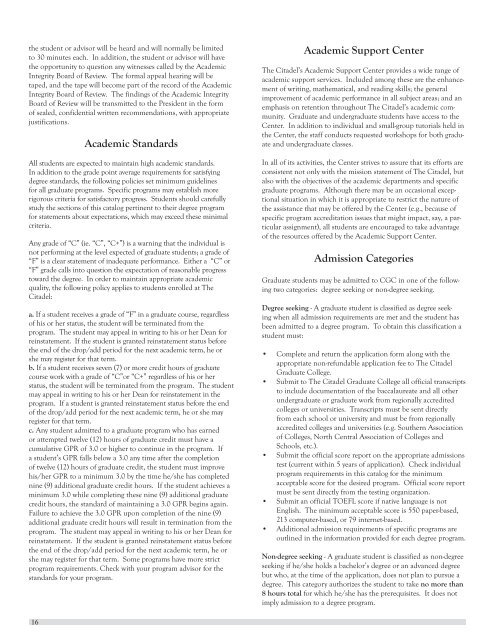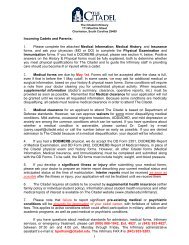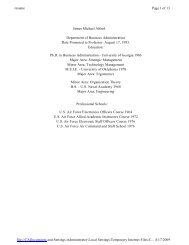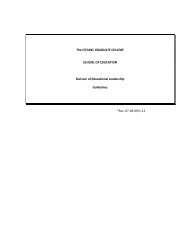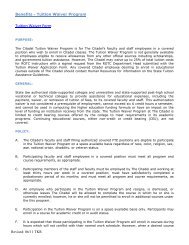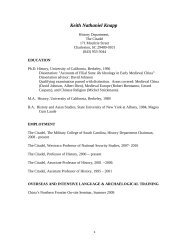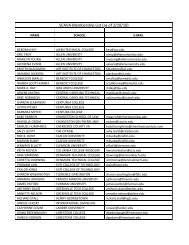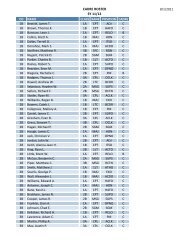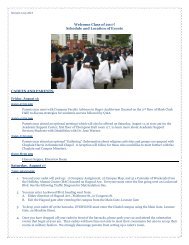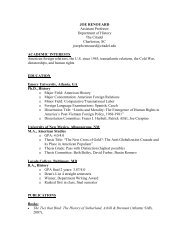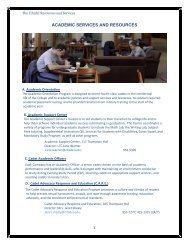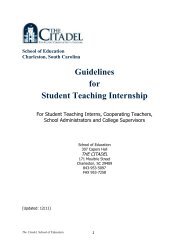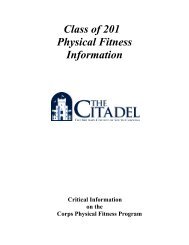2012-2013 CGC Catalog.indd - The Citadel
2012-2013 CGC Catalog.indd - The Citadel
2012-2013 CGC Catalog.indd - The Citadel
You also want an ePaper? Increase the reach of your titles
YUMPU automatically turns print PDFs into web optimized ePapers that Google loves.
the student or advisor will be heard and will normally be limited<br />
to 30 minutes each. In addition, the student or advisor will have<br />
the opportunity to question any witnesses called by the Academic<br />
Integrity Board of Review. <strong>The</strong> formal appeal hearing will be<br />
taped, and the tape will become part of the record of the Academic<br />
Integrity Board of Review. <strong>The</strong> findings of the Academic Integrity<br />
Board of Review will be transmitted to the President in the form<br />
of sealed, confidential written recommendations, with appropriate<br />
justifications.<br />
Academic Standards<br />
All students are expected to maintain high academic standards.<br />
In addition to the grade point average requirements for satisfying<br />
degree standards, the following policies set minimum guidelines<br />
for all graduate programs. Specific programs may establish more<br />
rigorous criteria for satisfactory progress. Students should carefully<br />
study the sections of this catalog pertinent to their degree program<br />
for statements about expectations, which may exceed these minimal<br />
criteria.<br />
Any grade of “C” (ie. “C”, “C+”) is a warning that the individual is<br />
not performing at the level expected of graduate students; a grade of<br />
“F” is a clear statement of inadequate performance. Either a “C” or<br />
“F” grade calls into question the expectation of reasonable progress<br />
toward the degree. In order to maintain appropriate academic<br />
quality, the following policy applies to students enrolled at <strong>The</strong><br />
<strong>Citadel</strong>:<br />
a. If a student receives a grade of “F” in a graduate course, regardless<br />
of his or her status, the student will be terminated from the<br />
program. <strong>The</strong> student may appeal in writing to his or her Dean for<br />
reinstatement. If the student is granted reinstatement status before<br />
the end of the drop/add period for the next academic term, he or<br />
she may register for that term.<br />
b. If a student receives seven (7) or more credit hours of graduate<br />
course work with a grade of “C”or “C+” regardless of his or her<br />
status, the student will be terminated from the program. <strong>The</strong> student<br />
may appeal in writing to his or her Dean for reinstatement in the<br />
program. If a student is granted reinstatement status before the end<br />
of the drop/add period for the next academic term, he or she may<br />
register for that term.<br />
c. Any student admitted to a graduate program who has earned<br />
or attempted twelve (12) hours of graduate credit must have a<br />
cumulative GPR of 3.0 or higher to continue in the program. If<br />
a student’s GPR falls below a 3.0 any time after the completion<br />
of twelve (12) hours of graduate credit, the student must improve<br />
his/her GPR to a minimum 3.0 by the time he/she has completed<br />
nine (9) additional graduate credit hours. If the student achieves a<br />
minimum 3.0 while completing these nine (9) additional graduate<br />
credit hours, the standard of maintaining a 3.0 GPR begins again.<br />
Failure to achieve the 3.0 GPR upon completion of the nine (9)<br />
additional graduate credit hours will result in termination from the<br />
program. <strong>The</strong> student may appeal in writing to his or her Dean for<br />
reinstatement. If the student is granted reinstatement status before<br />
the end of the drop/add period for the next academic term, he or<br />
she may register for that term. Some programs have more strict<br />
program requirements. Check with your program advisor for the<br />
standards for your program.<br />
Academic Support Center<br />
<strong>The</strong> <strong>Citadel</strong>’s Academic Support Center provides a wide range of<br />
academic support services. Included among these are the enhancement<br />
of writing, mathematical, and reading skills; the general<br />
improvement of academic performance in all subject areas; and an<br />
emphasis on retention throughout <strong>The</strong> <strong>Citadel</strong>’s academic community.<br />
Graduate and undergraduate students have access to the<br />
Center. In addition to individual and small-group tutorials held in<br />
the Center, the staff conducts requested workshops for both graduate<br />
and undergraduate classes.<br />
In all of its activities, the Center strives to assure that its efforts are<br />
consistent not only with the mission statement of <strong>The</strong> <strong>Citadel</strong>, but<br />
also with the objectives of the academic departments and specific<br />
graduate programs. Although there may be an occasional exceptional<br />
situation in which it is appropriate to restrict the nature of<br />
the assistance that may be offered by the Center (e.g., because of<br />
specific program accreditation issues that might impact, say, a particular<br />
assignment), all students are encouraged to take advantage<br />
of the resources offered by the Academic Support Center.<br />
Admission Categories<br />
Graduate students may be admitted to <strong>CGC</strong> in one of the following<br />
two categories: degree seeking or non-degree seeking.<br />
Degree seeking - A graduate student is classified as degree seeking<br />
when all admission requirements are met and the student has<br />
been admitted to a degree program. To obtain this classification a<br />
student must:<br />
• Complete and return the application form along with the<br />
appropriate non-refundable application fee to <strong>The</strong> <strong>Citadel</strong><br />
Graduate College.<br />
• Submit to <strong>The</strong> <strong>Citadel</strong> Graduate College all official transcripts<br />
to include documentation of the baccalaureate and all other<br />
undergraduate or graduate work from regionally accredited<br />
colleges or universities. Transcripts must be sent directly<br />
from each school or university and must be from regionally<br />
accredited colleges and universities (e.g. Southern Association<br />
of Colleges, North Central Association of Colleges and<br />
Schools, etc.).<br />
• Submit the official score report on the appropriate admissions<br />
test (current within 5 years of application). Check individual<br />
program requirements in this catalog for the minimum<br />
acceptable score for the desired program. Official score report<br />
must be sent directly from the testing organization.<br />
• Submit an official TOEFL score if native language is not<br />
English. <strong>The</strong> minimum acceptable score is 550 paper-based,<br />
213 computer-based, or 79 internet-based.<br />
• Additional admission requirements of specific programs are<br />
outlined in the information provided for each degree program.<br />
Non-degree seeking - A graduate student is classified as non-degree<br />
seeking if he/she holds a bachelor’s degree or an advanced degree<br />
but who, at the time of the application, does not plan to pursue a<br />
degree. This category authorizes the student to take no more than<br />
8 hours total for which he/she has the prerequisites. It does not<br />
imply admission to a degree program.<br />
16


